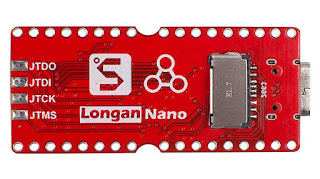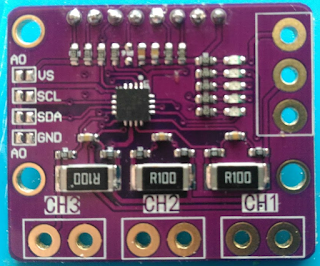Debugging memory corruption
Let's take something that happened to me today as an example
After a while, an assert triggers inside freeRTOS (because you activated FreeRTOS asserts and linked them to one of your breakpoint, of course when developping !)
Let's look at the assert :
#2 0x0800b5a4 in xQueueSemaphoreTake (xQueue=0x20001940 <ucHeap+4668>, xTicksToWait=<optimized out>) at /home/fx/Arduino_gd32/spotwelder_gd32/lnArduino/FreeRTOS/queue.c:1481
1481 configASSERT( pxQueue->uxItemSize == 0 );
So there is an inconsistency inside freeRtos mutex stuff.
Ok, let's look at pxQueue
(gdb) p *pxQueue
$14 = {pcHead = 0x20001940 <ucHeap+4668> "@\031", pcWriteTo = 0x20001940 <ucHeap+4668> "@\031", u = {xQueue = {pcTail = 0x20001940 <ucHeap+4668> "@\031", pcReadFrom = 0x20001940 <ucHeap+4668> "@\031"},
xSemaphore = {xMutexHolder = 0x20001940 <ucHeap+4668>, uxRecursiveCallCount = 536877376}}, xTasksWaitingToSend = {uxNumberOfItems = 0, pxIndex = 0x20001958 <ucHeap+4692>, xListEnd = {
xItemValue = 18446744073709551615, pxNext = 0x20001958 <ucHeap+4692>, pxPrevious = 0x20001958 <ucHeap+4692>}}, xTasksWaitingToReceive = {uxNumberOfItems = 0, pxIndex = 0x20001970 <ucHeap+4716>,
xListEnd = {xItemValue = 18446744073709551615, pxNext = 0x20001970 <ucHeap+4716>, pxPrevious = 0x20001970 <ucHeap+4716>}}, uxMessagesWaiting = 0, uxLength = 1, uxItemSize = 2105344, cRxLock = -33 '\337',
cTxLock = -33 '\337'}
The end is full of garbage, no need to understand what it means.
So we'll put a hw breakpoint on a field that should not change too often.
uxNumberOfItems seems like a nice candidate
(gdb) p &xQueue->xTasksWaitingToSend.uxNumberOfItems
$22 = (volatile UBaseType_t *) 0x20001950 <ucHeap+4684>
(gdb) watch *(int *)0x20001950
Hardware watchpoint 5: *(int *)0x20001950
So now the code will stop every time that address content is changed.
/!\ It works because, in my case, the address in ram will stay the same as long as you don't change the code. Double check that's the case /!\.
Restart the code, it stops at the beginning when the memory is filled with zero.
Continue and just wait.
Hardware watchpoint 5: *(int *)0x20001950
Old value = 0
New value = 8
OLEDCore::myDrawChar (this=this@entry=0x20001998 <ucHeap+4756>, x=3, y=<optimized out>, c=<optimized out>, invert=<optimized out>)
at /home/fx/Arduino_gd32/spotwelder_gd32/lnArduino/libraries/simplerSSD1306/ssd1306_ex_ll.cpp:177
177 mask>>=1;
Update 2:
Nope, it's a bug with the modified nuclei freeRTOS port. Using the QQ one fixes all problems.




Comments
Post a Comment